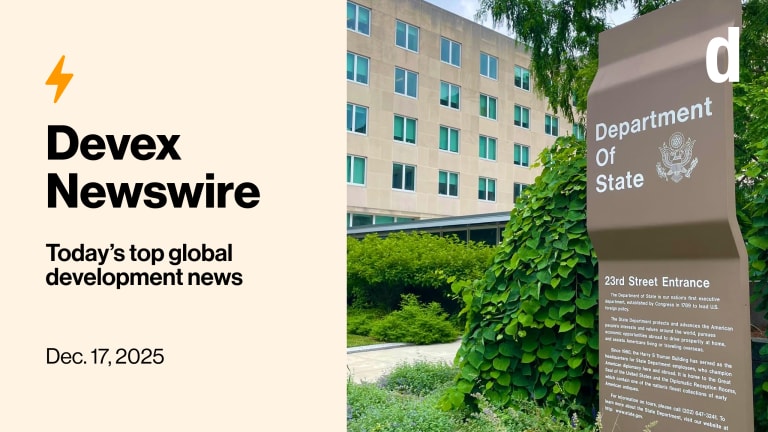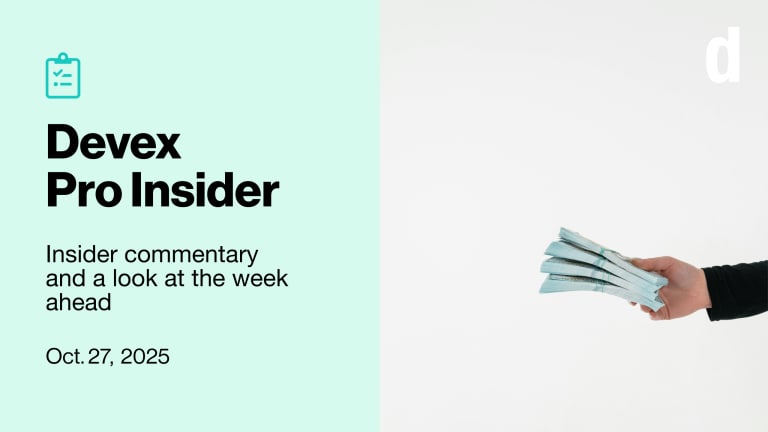
ERBIL, Iraq — Nineveh province in northern Iraq was once a proud commercial center for the country and the region, with fertile soil and a large, multiethnic population. Then came the Islamic State.
Many once-successful businesses were systematically dismantled and destroyed during the Islamic State’s brutal reign, and now these businesses face the prospect of building back from the ground up. They must do so against the backdrop of a government that has driven hundreds of thousands of citizens into the streets to protest corruption and general dysfunction, and a highly risk-prone environment for potential investors.
Last week, with those challenges in mind, the U.S. Agency for International Development hosted the Nineveh Investment Forum in Erbil. With the support of Vice President Mike Pence — who delivered a letter to participants via U.S. Ambassador to Iraq Matthew Tueller — regional and U.S. government officials, Iraqi businesspeople, development finance representatives, and international financiers surveyed the investment potential of a region still crippled by years of war.
“The financial system [in Iraq] is somewhat fragile … Banks are not really developed. Banks are not in the business of lending.”
— Raed Adnan, investment executive, GroFinErbil serves as a de facto humanitarian and development hub for northern Iraq, located about 50 miles east of Mosul in the semi-autonomous region of Kurdistan, which borders Nineveh province. ISIS never penetrated Erbil’s considerable defenses, and today the city enjoys relative security and stability.
Qubad Talabani, deputy prime minister of the Kurdistan Region, told the forum attendees that Kurdistan welcomes the opportunity to serve as a “gateway” to investment in Mosul and the Nineveh region, a historically multiethnic place that has seen its social fabric torn apart.
Talabani addressed some of his remarks to the newly-elected governor of Nineveh province, General Najm al-Jabouri, who led Iraqi security forces in the battle of Mosul, which ousted ISIS from the city in 2017.
“The security forces of Mosul will need the support of its citizens. For that, the task list is clear: improve electricity, health care services, education services, water and sanitation, facilitate economic growth, invest in job-creating factories, attract and support the investment of the private sector, eliminate bureaucracy, target corruption,” Talabani said.
“Do all that, and the citizens will support you. Do more, and the citizens will protect you. Do less, and the citizens will turn on you,” he told the new governor, whose appointment last month was considered illegitimate by some, including the former governor.
Many investors and business people are finding that security is a necessary yet insufficient piece of the recovery equation. Despite multiple reassurances — including from Mosul’s Mayor Zuhair Mouhsin al-Araji — that the city is “safe and ready” for an economic boom, the region’s entrepreneurs continue to face an uphill battle for investment, not all of which can be blamed on the Islamic State.

The cost of doing businesses
Those who once ran successful business in northern Iraq, only to see those businesses dismantled by a terrorist insurgency, now face the daunting prospect of having to become startup entrepreneurs in a country that is notorious for making that extremely difficult.
Bashar Yousif Jomoo runs the Nahrain Agricultural Association, which works on fattening calves and held 100,000 acres of land before ISIS invaded the Nineveh Plains, confiscated land and seized tractors and harvesters from the farmers who operated them. Jomoo wants to get his business up and running again, but he cannot obtain the necessary land ownership documents that the Central Bank in Baghdad requires to issue a loan.
Another agribusiness entrepreneur, Khairi Dakhil Sleman, said that he applied to Iraq’s agricultural bank for a loan, but never received a response.
Experiences like this appear more epidemic than anecdotal.
Despite being an upper-middle-income country, Iraq ranks 172nd on the World Bank’s “Doing Business” report, which measures countries’ performance on a range of indicators related to their business environments. In Iraq, it takes 26 days on average to register a new business, while in the United Arab Emirates — which ranks 16th on the index — it takes only 3.5 days. In Iraq, entrepreneurs can expect to spend 34% of their income per capita to establish a new business. In the UAE, the average cost is half of that.
“Iraq has not really developed its ecosystem for the private equity system,” said Raed Adnan, investment executive at GroFin, a private development finance institution that works with USAID in northern Iraq.
“The financial system is somewhat fragile … Banks are not really developed. Banks are not in the business of lending. You don’t have that knowledge [among] ordinary people of credit and credit analysis. You don’t have a credit bureau. You don’t have ratings,” he said.
For institutions like GroFin, who are willing to wade through the additional costs and higher risks that come with investing in small- and medium-sized enterprises in northern Iraq — in large part because GroFin’s own investors are willing to do so — it takes a particular mentality.
Adnan said that GroFin’s “high touch” approach, which involves significant technical support, means that its lead time before disbursement is much higher in Iraq than in other countries in the region.
“Security for us is not really a problem. It’s been dealt with … but then, at the end of the day, you have to perform. We have our KPIs and we have our investors and reporting to do, and each individual has a set of goals and targets … It boils down to, at the end of the day, are we able to do that given the constraints,” he said.
“The government must understand that its role is to get out of the way and facilitate and allow the private sector to develop Iraq.”
— Dana Mansuri, Iraq mission director, USAIDInvestors who do want to work in regions characterized by greater risks and higher costs have to be willing to adjust their expectations, said Sam Parker, director of the Shell Foundation.
“For somewhere like northern Iraq, if you want to deploy a lot of capital, then you probably have to adjust your investment strategy to come in and find an investor with a tolerance for a zero return, but a lot of impact,” Parker said.
For aid donors that are used to funding programs through grants or other models that offer no financial return on their investment at all, losing some money while supporting high-risk, high-impact businesses is not necessarily a bad thing, Parker said. Even if an investment fund absorbs a 10% loss — because of the high costs of doing technical assistance and working in an unstable region — they would still see the other 90% of their money return to be used for other projects.
“The big prize is the donor community has to know — and the governments that manage their budget wake up to — the fact that you can create that impact at a tiny portion of the cost through using this slightly more commercial mechanism,” Parker said.

‘Where are the Americans?’
USAID currently oversees roughly $1 billion in programming in Iraq, and has invested about $400 million in Nineveh province, said Hallam Ferguson, senior deputy administrator of USAID’s Middle East bureau. The region has been a particular priority for Pence, who has exerted unusual influence over USAID’s programs, personnel, and award decisions in his effort to see more U.S. assistance flow directly to religious minorities, instead of through the United Nations.
USAID is increasingly recognizing that its own resources pale in comparison to both the amount of investment required in the region, and the power of the private sector to spur economic growth in the region.
“The future is vested in the private sector, in the enthusiasm, the energy, and bravery of Iraq’s entrepreneurs, who understand they cannot wait for the government to make it happen, and the government must understand that its role is to get out of the way and facilitate and allow the private sector to develop Iraq,” said Dana Mansuri, USAID’s Iraq mission director.
Given the country’s problems with security, cumbersome bureaucracy, and political instability, that private sector-led renaissance is not happening as quickly as might be hoped.
American investors have been particularly hesitant to engage, said Timothy Mills, president of the American Chamber of Commerce in Iraq. The country’s four largest trading partners are Iran, Turkey, China, and South Korea, Mills said.
“What we get when we visit with our Iraqi ministry friends is the question — where are the Americans?” Mills said.
The U.S. government’s own tools are limited. The Export-Import Bank, which helps U.S. exporters finance trade deals, is prohibited from working with private sector entities in Iraq, as a result of its own risk mitigation policies.
The Overseas Private Investment Corp. — soon to become the U.S. International Development Finance Corp. — only provides financing to U.S. businesses, though these might employ local workers. The OPIC representative meant to join one of the panels at the investment forum via teleconference was unable to connect — a moment of unintended symbolism, and a reminder of northern Iraq’s precarious infrastructure.
To help create a bridge between investment-ready businesses in areas liberated from ISIS and investors willing to take some risk and achieve development impact, USAID has funded the Iraq Governance and Performance Accountability project, which is implemented by DAI. The Nineveh Investment Forum was one piece of that project, a matchmaking opportunity for entrepreneurs to mingle with financiers.
Some of them have already found success.
While the majority of Iraqi businesspeople who spoke about their enterprises ran businesses before ISIS’s incursion, a discussion on entrepreneurship featured two young Iraqis, and struck a noticeably different tone.
Yadgar Merani founded the tech startup Lezzoo in 2017, just after he finished his studies in London and returned to Erbil. Inspired by other app-powered delivery companies, Lezzoo provides on-demand delivery services for food, groceries, and pharmaceuticals in the Kurdistan Region of Iraq. It was the first Iraqi startup accepted into Y Combinator, the vaunted American accelerator that launched Airbnb and Dropbox, among others.
Even with his uncommon connections, Merani still has to contend with the challenges of operating a growing business in northern Iraq. Lezzoo has grown quickly, creating new problems in a country without a banking infrastructure.
“Currently our traction is quite great in terms of our numbers, but doing all of that at scale, only based on cash, can be a nightmare and a disaster,” Merani said.
“We’re talking about at least $700,000 worth of [gross merchandise value] a month. That just circulates through a network of delivery employees, as well as accountants. We’re constantly moving this cash around the city … This is not the job of a startup. It should be a bank that’s providing this kind of solution,” Merani said.
At the same time, Merani said, the experience of entering a market and coming to terms with its failures creates new opportunities for innovation, adding that if the front line entrepreneurs are able to find solutions that can make it easier for other tech-enabled businesses to emerge, then both public and private sectors will benefit.
“The coming revolution of Iraq will be the youth,” Merani said.
Update, Dec. 9, 2019: This article has been updated to clarify the reference to DAI.








